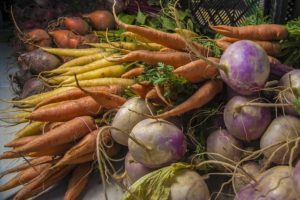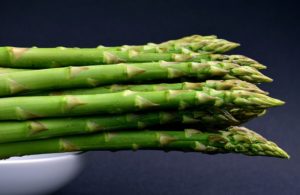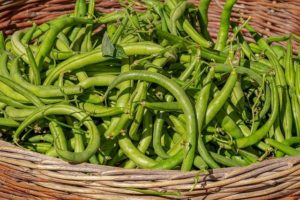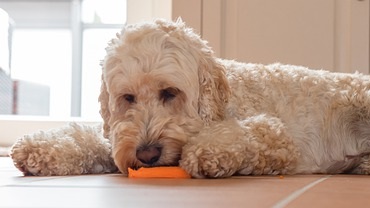What Vegetables Can My Dog Eat?
We’ve always tried to feed our Sunny the best stuff we can find, and are pretty careful about the commercial foods he gets. From the start, we’ve avoided the common treats found at the pet food stores. Not that he never gets them, we aren’t completely strict, but we rarely give them to him. Just a choice on our end, but we don’t stop people dolling out a ‘bone’ or two when we go to the bank, and we’re at a number of pet adoption events during the year where there are always commercial treats available. When we first brought Sunny home and started potty training though we did a couple of things to get him started in the right direction. First, we hung a little sleigh bell on the door knob, and then every time we took him out, we first had him use his paw or nose to ‘ring’ the bell. When we came back in after a successful potty, we gave him a piece of green bean or fruit. 5 1/2 years later, his only treats at home are fruits and veggies, mostly frozen green beans. We found that a bag of beans would sometimes spoil, so we started freezing them and have been doing this routine for years. So, what other veggies are okay for him, and your dog?
Root Vegetables (carrots, beets, sweet potatoes, parsnips, etc)
 Generally root veggies are fine for your dog. Carrots, beets, parsnips, etc. cut up into bite size chunks give them a great texture and lots of vitamins. Potatoes though should not be given raw as they contain some things that can cause an upset stomach. They can be given cooked, baked/boiled/roasted, no fats, and be sure to take the skin off too, as this can be hard for them to chew, and can get stuck in their teeth. Many root vegetables are high in sugars as well, so like a lot of fruits and vegetables, just don’t go overboard, especially if you’re facing a weight issue with your girl.
Generally root veggies are fine for your dog. Carrots, beets, parsnips, etc. cut up into bite size chunks give them a great texture and lots of vitamins. Potatoes though should not be given raw as they contain some things that can cause an upset stomach. They can be given cooked, baked/boiled/roasted, no fats, and be sure to take the skin off too, as this can be hard for them to chew, and can get stuck in their teeth. Many root vegetables are high in sugars as well, so like a lot of fruits and vegetables, just don’t go overboard, especially if you’re facing a weight issue with your girl.
Broccoli, Cauliflower, Corn, Brussel Sprouts
We eat a lot of broccoli, cauliflower and Brussel sprouts at our house, and Sunny is always patiently hoping a piece comes flying off the cutting board when I’m getting things ready. He really appreciates my ‘accidental’ slip. I also like to peel the broccoli stalks and cut them up lengthwise like ‘carrot stick’ style and keep them in the fridge for some variety. These are all high in a number of important vitamins like A, B6, B12, D, E and K and minerals calcium, iron, phosphorous, etc. Broccoli stalks can also help with clearing tooth debris, and cauliflower has a pretty high water and fiber content so filling and good for hydration.
Asparagus and Celery
 Sunny just loves Asparagus which we also enjoy quite often at home. Asparagus has a long list of vitamins (A, B6, C, E, K) and minerals, fiber and antioxidants, so great for our fur babies and helps to flush out toxins and free radicals. The vitamins and minerals support their immune system and help with a number of things like maintaining a healthy coat, strong bones and teeth, even help with eyesight. Sunny prefers the center, more tender pieces of celery (me too) and we don’t give it to him very often, but he seems to like the variety and the crunch. We also keep the pieces small and always keep an eye on him, because the stringy bits sometimes getting stuck in his teeth. It’s quite simple to “destring” celery with a knife. Here’s a cute YouTube video on how to do it. Celery is a member of the parsley family, and among it’s benefits can be help for pups with arthritis.
Sunny just loves Asparagus which we also enjoy quite often at home. Asparagus has a long list of vitamins (A, B6, C, E, K) and minerals, fiber and antioxidants, so great for our fur babies and helps to flush out toxins and free radicals. The vitamins and minerals support their immune system and help with a number of things like maintaining a healthy coat, strong bones and teeth, even help with eyesight. Sunny prefers the center, more tender pieces of celery (me too) and we don’t give it to him very often, but he seems to like the variety and the crunch. We also keep the pieces small and always keep an eye on him, because the stringy bits sometimes getting stuck in his teeth. It’s quite simple to “destring” celery with a knife. Here’s a cute YouTube video on how to do it. Celery is a member of the parsley family, and among it’s benefits can be help for pups with arthritis.
Squash
Butternut and pumpkin squash are great treats and can help with cases of diarrhea in dogs. Many squashes are going to be too hard to eat raw, and raw could also cause some stomach upset, so stick with cooked pieces for squash and be sure to skip the seasonings and fats. Some dogs may enjoy the softer varieties like zucchini or summer squash raw, or a great idea is to shred, then cook lightly as an addition to their regular food. This will give them some interesting contrast, good fiber and water content, and may help your fast-eater slow down a bit. I included cucumbers in our post about fruits that are good for dogs, because it’s one of those technicalities, but will include here as well. They’re great for overweight dogs because they have virtually no carbs, oil or fat, loaded with biotin, copper, magnesium and potassium and vitamins B1, C and K as well. Sunny doesn’t eat them, although he will take take a slice but we’ll usually find it later, abandoned somewhere – uneaten.
Legumes
 Green beans, peas and other legumes are a good source of vegetable protein. They’ve had some press over the last couple of years related to canine dilated cardiomyopathy (DCM) and while the experts are recommending more studies, the American Society of Animal Science essentially concluded, “there is no definitive relationship (between) these implicated diet characteristics (legumes in the diet/food) and DCM.” You can read the full article here. As I’ve mentioned earlier, we feed Sunny frozen green beans pretty regularly. He’ll sit patiently on a rug (so as not to drool on the floor) when I’m getting the bag of frozen beans out of the freezer. Now, obviously neither he nor I are scientists, but, I know he does love them, and if further studies indicate an issue with them, we’ll be sure to find another treat, but we’ve been enjoying them together for his whole life. We honestly haven’t tried other legumes, but if I know our boy, he’d probably enjoy some peas as well.
Green beans, peas and other legumes are a good source of vegetable protein. They’ve had some press over the last couple of years related to canine dilated cardiomyopathy (DCM) and while the experts are recommending more studies, the American Society of Animal Science essentially concluded, “there is no definitive relationship (between) these implicated diet characteristics (legumes in the diet/food) and DCM.” You can read the full article here. As I’ve mentioned earlier, we feed Sunny frozen green beans pretty regularly. He’ll sit patiently on a rug (so as not to drool on the floor) when I’m getting the bag of frozen beans out of the freezer. Now, obviously neither he nor I are scientists, but, I know he does love them, and if further studies indicate an issue with them, we’ll be sure to find another treat, but we’ve been enjoying them together for his whole life. We honestly haven’t tried other legumes, but if I know our boy, he’d probably enjoy some peas as well.
Leafy Greens and Cabbage
We’ve all heard about the benefits of kale, spinach, collards, etc. for humans and many of the same vitamin rich attributes are great for our pups as well. Our guy will eat raw spinach from the fresh supply we use, and loves a few crunchy bits of cabbage. Some of the dark leafy veggies can be bitter so they may need to be blanched or steamed to make them more palatable for the dogs, but it’s fun to experiment too. I’d recommend going easy on quantities, especially on cabbage as there can be a gassy result if over done.
What’s your experience?
While we’ve fed our guy vegetables since his was a few weeks old, if you haven’t fed veggies to your pup, you may find she doesn’t take to them right away or maybe at all. If you’d like to start, try a wide variety of things and see what may work. Sunny’s a Golden Retriever so his bites can be bigger than if you have a small breed, so keep the bites size-appropriate. Don’t make big diet changes, just gradually introduce some different types and varieties slowly. A big change can cause some tummy upset, just as when changing food brands. Please ask your vet if you have any questions, and listen to her advice. We’d love to hear what’s working and what’s not, and what your dog’s favorite veggie treats are. Drop us a note, comment, or head on over to Featured Friends and share your pet’s story there.

